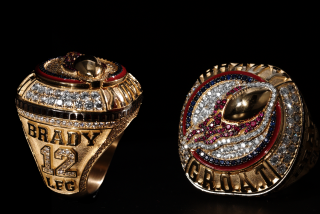Alysheba Given Two Pre-Race Blood Tests : N.Y. Racing Authorities Act on Tip That Illegal Drug Might Be Used
Controversy continues to plague the career of Alysheba, the Kentucky Derby and Preakness winner who was kept under pre-race surveillance at Saratoga Saturday because of reports that he might be illegally medicated before running in the $1.1-million Travers Stakes.
Alysheba, who went off the 2-1 favorite and ran sixth, 20 lengths behind the victorious Java Gold in the worst performance of his career, was given two blood tests for medication before the Travers, and the results were negative. After the race, Alysheba was given blood and urine tests and those results may be available today.
If the post-race tests are negative, Alysheba may only be the victim of unfounded rumors, similar to the ones that surrounded Bet Twice when he ran fifth as the heavy favorite in the Florida Derby at Gulfstream Park in April.
If the tests are positive, however, racing will have another damaging scandal to live with. Dancer’s Image, the winner of the 1968 Kentucky Derby, was disqualified for running with an illegal painkiller; several New York jockeys were implicated in race-fixing schemes in the 1970s, and one of the Aga Khan’s horses was thought to have raced with a souped-up drug in the Breeders’ Cup in 1985 at Aqueduct, then was exonerated after an appeal.
Horses are allowed to train but not race with medication in New York. Alysheba was kept under observation at his barn most of Saturday after Saratoga officials were told by New Jersey state police at Monmouth Park that there was a report the horse might be given a painkiller. Alysheba ran at Monmouth in the Haskell Invitational Aug. 1.
Horses are routinely tested before races in New York, one of the few states that has that safeguard for the betting public. Manny Gilman, a veterinarian who is also one of Saratoga’s stewards, ordered a second pre-race test because of the rumors.
The first four finishers in the Travers--Java Gold, Cryptoclearance, Polish Navy and Gulch--were tested after the race, and Alysheba probably would have been tested even had there not been drugging rumors, since he was the beaten favorite.
According to track officials, Jack Van Berg, who trains Alysheba, was told of the suspicions and cooperated with them Saturday.
Van Berg was in Canada Monday and could not be reached for comment. Clarence Scharbauer Jr., whose family owns Alysheba, did not return phone calls, and Gilman referred questions to the New York State Racing and Wagering Board.
Alysheba’s poor performance in the Travers has been attributed to the colt’s inability to handle the sloppy track. Chris McCarron, who rode Alysheba, said that the colt broke well but didn’t run a step after that.
“It’s probably because of Alysheba’s drug habit that this story got started,” a New York racing official said.
Alysheba’s winning performances this year have been questioned by racing purists because they were achieved while he was using Lasix, an anti-bleeding medication that is permitted in Kentucky and Maryland.
Alysheba bled slightly from the lungs in a race at Santa Anita, which made him eligible to be treated with Lasix in California, Kentucky and Maryland.
In his next start, using Lasix, Alysheba ran second in the San Felipe Handicap at Santa Anita. His problem was then diagnosed as a respiratory one, rather than bleeding, and Alysheba underwent minor surgery to clear his windpipe.
Alysheba continued to be treated with the diuretic in Kentucky, where he was first in the Blue Grass Stakes and the Kentucky Derby, although he was disqualified and placed third for interference in the Blue Grass.
Alysheba won the Preakness at Pimlico two weeks later with Lasix, but in the Belmont he was forced to run “clean” because of New York rules and missed the Triple Crown title and a $5-million payoff when he finished a well-beaten fourth.
In the Haskell, Alysheba was bothered by a rash that almost made Van Berg scratch him. The trainer could have run Alysheba on Lasix but didn’t, explaining that since the colt was going to have run without medication in the Travers, he might as well see if he could run without it at Monmouth. Alysheba didn’t bleed in the Haskell and finished second, a neck behind Bet Twice, who also won the Belmont.
Alysheba has won 1 of 11 races without Lasix and has finished first in 3 of 4 starts with it.
Bet Twice’s handlers were puzzled when he ran so badly in the Florida Derby.
There was a disturbance in a nearby barn that diverted Bet Twice’s security guard the night before the race. Jockey Craig Perret said the colt was sluggish warming up in the post parade, and the Gulfstream stewards, in an oversight, neglected to have the beaten favorite tested after the stake.
More to Read
Get our high school sports newsletter
Prep Rally is devoted to the SoCal high school sports experience, bringing you scores, stories and a behind-the-scenes look at what makes prep sports so popular.
You may occasionally receive promotional content from the Los Angeles Times.






